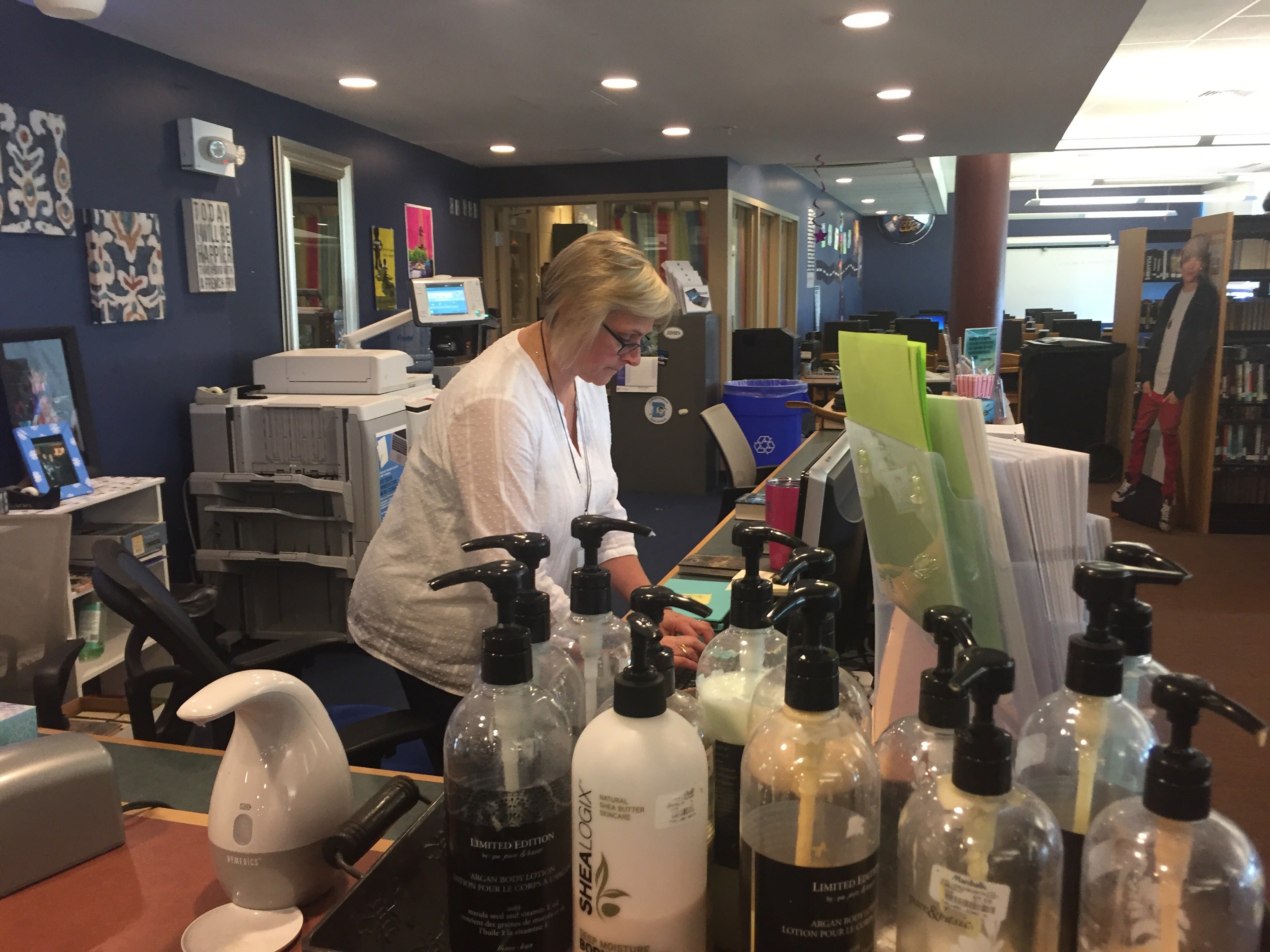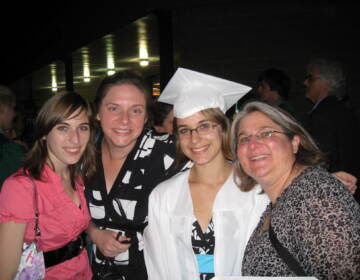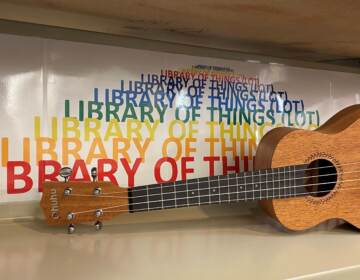Delaware’s endangered education species — the school librarian
Listen 3:33
Debbie Supplee, librarian at Dickinson High School, runs an operation stocked with more than 12,000 books but also serves as computer lab, study hall, makeshift film studio, place to get coffee and hand cream, and sanctuary for kids to sort out emotions or find solitude. (Cris Barrish/WHYY)
Fewer and fewer Delaware schools have certified librarian as principals look to put more educators in the classroom.
Every morning in the library at McKean High School near Milltown, students and faculty converge on a coffee bar to order java and prepare for the day.
McKean’s coffee counter exemplifies how libraries have evolved in the 21st century. No longer just a quiet space where students read or work on papers, libraries are for online research, collaborative learning, even video production or a jolt of caffeine.
“We are kind of this center of the school,” McKean librarian Cindy Monger said. “Students come here individually to work on things, to do research, to apply for jobs, Teachers bring their classes here for research and to use the computers. We’re very popular in the mornings.”
In Delaware, though, financial struggles have led more and more schools to mothball libraries and lay off the highly trained educators who run them.
The state’s largest district, Christina, no longer has librarians in its six middle and high schools. Students who want access to the stack of books can only go if the teacher takes the class.
WHYY asked Christina officials to visit some of those libraries, but the district denied our request.
The New Castle County Vo-Tech district has four high schools, yet only one has a librarian. The other three are staffed by a lower-paid and lesser-trained paraprofessional.
The bottom line is that fewer and fewer of Delaware’s 137,000 public school students have access to a qualified librarian. A 2013 report found that roughly half of Delaware’s 250 public schools had a librarian and said “library services continue to deteriorate.”
Four years later, there are fewer librarians. Rachel West, president of the Delaware Association of School Librarians, said her group has been working on getting the exact figures but calls the situation “dismal.”
West and other library advocates noted that certified librarians have master’s degrees and possess the academic expertise and technology know-how to help students properly research and document papers and prepare them for college-level research. They can help students differentiate real information from fake news — a critical skill in today’s Internet and social media-dominated landscape.
West emphasized that research can be complicated, and librarians have the tools to simplify the process.
“I liken research to a treasure hunt,” said West, librarian at the private Salesianum School for boys. “Either you dig up a whole lot of sand and not find anything special or build your search smartly and intelligently. It’s like having a treasure map going straight to the X.”
Part of the reason schools are jettisoning librarians is money. The average salary for a Delaware certified school librarian is more than $60,000 a year plus benefits, whereas the pay for paraprofessionals averages roughtly half that amount. Not staffing the library at all costs nothing, of course.
But McKean’s parent district, Red Clay, has made a commitment to maintain and enhance libraries for its 16,000 students.
Judith Conway, Red Clay director of unified arts, said the district is committed to libraries and librarians.
“With budget cuts everybody has to take their share, but it’s pretty much like our share isn’t any different than anyone else’s share,” Conway said.
‘I would be completely lost’
Take Dickinson High.
The school’s library is stocked with more than 12,000 volumes — not only literary classics, biographies and academic tomes but hundreds for students learning English, devotees of graphic novels, even those in the LGBTQ community.
But it’s also a computer lab, study hall, makeshift film studio, a place to get coffee and hand cream, and serves as a sanctuary for kids to sort out emotions by fiddling with a puzzle or find solitude from a pressure-filled day.
Debbie Supplee, Dickinson librarian, said the library not only enlightens but provides solace.
“We have a lot of kids who have a high level of anxiety in school, and have a trauma going on at home, and this is a great way for them to come in and just decompress,” she said. “So they come in, they sit down, it might be at the end of a class period, it might be during lunch, and they just kind of mess around with the puzzle.”
Joelle Wilkins, who will be a Dickinson senior in the fall, calls the library her salvation.
“I usually come to the library about every day,” Wilkins said. “I have a really rough time staying in class where it’s really loud so I do my work, usually, in here and it’s quiet and I feel comfortable. It really helps me to concentrate … Without the library I would be completely lost.”
McKean student Nelson Cruz-Collazo expressed similar sentiments. “I really don’t know where I would be without the library, because it’s very hard to like, focus in on things if you don’t have that way out,” he said.
The Colonial district is taking a different route at William Penn High, spending $600,000 of taxpayer dollars and a $250,000 donation from Discover Card to renovate the library into what it’s calling a cutting-edge Innovation Center.
The center will have fewer books but more online resources, meeting space and the Penn Bistro cafe. It will be staffed by a paraprofessional and a distance learning coordinator, district spokeswoman Lauren Wilson said.
But Conway says Red Clay libraries have already evolved, organically and by design, with aisles of books remaining a dominant feature. She argues that when schools de-emphasize their libraries, the students suffer.
“They’re missing a lot,” Conway said. “Research has shown that if you have a certified librarian in the school, test scores are higher. And there’s a good reason for that.”
WHYY is your source for fact-based, in-depth journalism and information. As a nonprofit organization, we rely on financial support from readers like you. Please give today.





